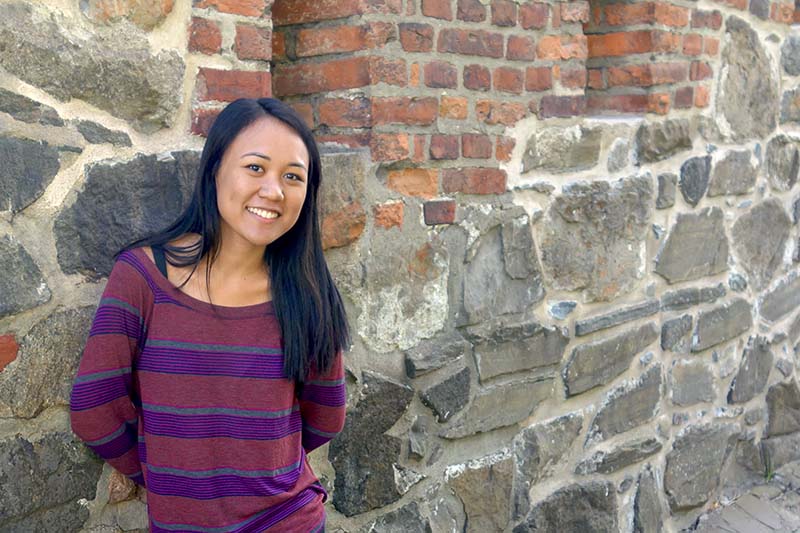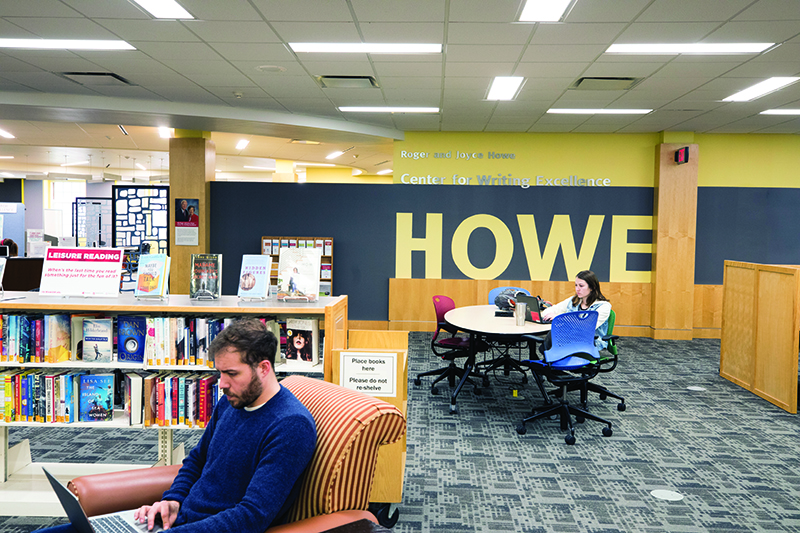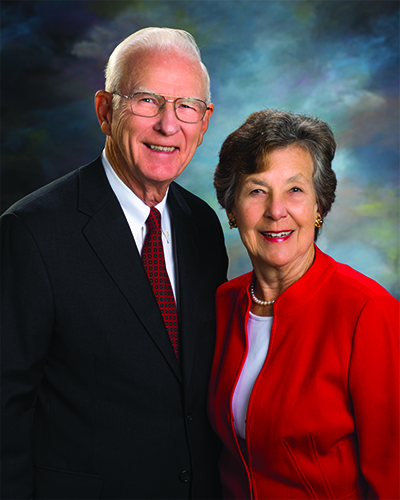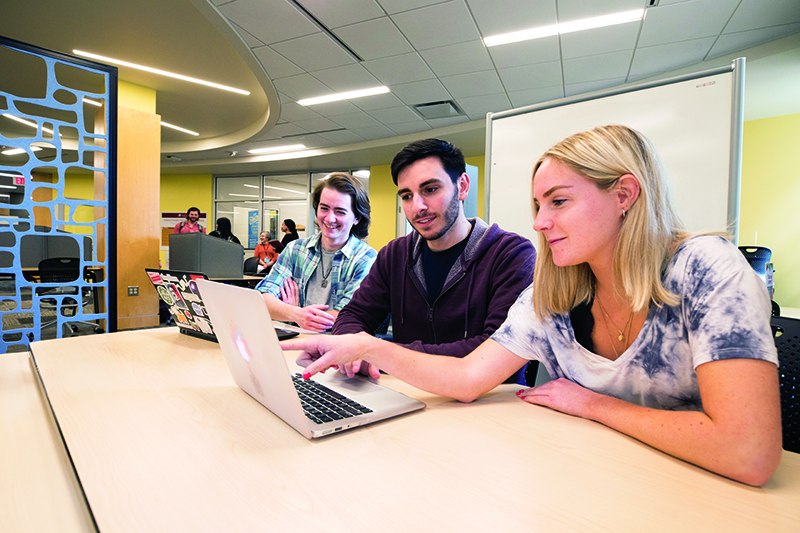

Howe Center for Writing Excellence champions clear, concise and persuasive writers
"What writing does is to reveal" – Rita Dove (Miami ’73)

Illustration by Katrina Tanbi Kessler (Miami '20)
By Donna Boen (Miami ’83 MTSC ’96) and Angela Glotfelter (Miami MA ’17)
Sitting in her early afternoon journalism class at Columbia University, Mariel Padilla (Miami ’17) was listening to her professor discuss email encryption for reporting across borders when she received a text from her friend across the room.
“I think you just won a Pulitzer,” it read. “Were you on this story?”
“This story” was The Cincinnati Enquirer’s “Seven Days of Heroin.”
The summer she graduated from Miami, Padilla interned with the Enquirer at the urging of Patti Newberry, a Miami journalism associate lecturer and a former Enquirer staffer.
As part of her internship, Padilla visited the county jail each morning during that designated week to sort through hundreds of arrest slips and flag opioid mentions. She then created a spreadsheet, documenting the time, location and nature of every opioid-related arrest over those seven days.
Now working on a master’s at Columbia nearly a year after her internship, Padilla was so focused on “trying to stay alive in graduate school” that she had no idea the Cincinnati daily was even nominated for the premier award.
Responding to her friend’s text, she wrote, “Yeah, I was on that story, but I don’t think I’d be on the Pulitzer.”
Her friend texted back, emphatic this time, “I think you just won a Pulitzer!”
Careful not to disrupt the class, Padilla googled for any details. When she saw that her name was indeed included among the story’s team of writers, she immediately texted her family in Columbus, Ind. But she remained quiet because she didn’t want to bother her professor.
“She was so mad at me,” Padilla said. “She was like, ‘I can’t believe you didn’t interrupt me. You should have stopped me from talking. Why didn’t you say something?’ ”
The Howe Writing Center, under the umbrella of the HCWE, believes all writers have more to learn; learning to write effectively requires different kinds of practice, time and effort; revision is central to developing writing; and reflection is critical for a writer’s development.
“A word after a word after a word is power.” – Margaret Atwood, Canadian poet and novelist
Padilla learned how much power words can hold while a student consultant with the Howe Writing Center, part of the Howe Center for Writing Excellence (HCWE) at Miami University. She worked at the center on the first floor of King Library from her sophomore through her senior years.
Giving other students feedback on their papers and projects made her ultra-conscious of how words affect people.
“The Howe Writing Center and my experience there shaped the type of writer I am, and it definitely was a huge part of my time and growth at Miami University,” she said. “It also increased my love for writing.”
Graduating from Columbia in 2018, she’s now reporting for The New York Times, having started her yearlong fellowship in June on the national breaking news desk.
The Times’ tight deadlines give her few moments to reflect on the impact of her words. She’s grateful that their power is ingrained in her due to the Howe Center’s weekly workshops.
“It made me a better writer and very conscious of what writing means or what writing could mean to people,” said Padilla, who double majored in strategic communication and English.
 “Words are a lens to focus one’s mind.” – Ayn Rand, best-selling Russian-American author and philosopher
“Words are a lens to focus one’s mind.” – Ayn Rand, best-selling Russian-American author and philosopher
Writing is hard. That’s why the Howe Center exists, both to provide support for students through the Howe Writing Center and to offer services and resources to faculty through the Howe Writing Across the Curriculum programs.
“There’s no place else in the country that has a $15 million endowment for writing,” said Elizabeth Wardle, director of the HCWE since 2016. “What the Howes have funded is this comprehensive center where we innovate as we see needs arise, and we don’t have to constantly justify the need for the funding.”
Wardle is particularly passionate about the Howe Faculty Writing Fellows program, part of the HCWE’s Writing Across the Curriculum initiatives designed to help faculty improve how they assign and support student writing.
One such fellow is Jon Trauth, visiting assistant professor of family science and social work. His journey as a social worker began in El Salvador and Nicaragua, where his fire for homeless advocacy was sparked. That led him to graduate school, where he was diagnosed with binocular dysfunction and dyslexia, which helped to explain his dread of writing.
Wanting to assist his students the way his mentors helped him, Trauth taught a first-of-its-kind class last spring, an advanced writing course for the helping professions. He and other faculty developed it during the fellows program, blending academic and professional genres to show that effective advocacy depends on writing well in everything — from letters to clients’ caregivers to assessments, treatment plans and case notes.
“Writing will help you in your advocacy,” he said, “and hopefully that advocacy will, in turn, give back in a way that helps your programs be funded better, helps you get better grants or helps you serve populations that in the past were never served.”
Miami faculty embrace teaching in a way that Wardle’s never seen before. She considers it serendipitous that the center is at Miami. Miami’s faculty is ranked No. 3 nationally in undergraduate teaching by U.S. News & World Report because they care about teaching and learning as much as research, she said. “The Howes have funded something that really fits with the Miami identity and value system.”
“To write is to think and to write well is to think well.” – David McCullough, Pulitzer Prize-winning historian and author
So why have Joyce Lutz Howe (Miami ’57), a graphic arts major, and Roger Howe (Miami ’57), a business major, given more than $15 million to improve student writing?
Near the start of Miami’s $100 million campaign in the 1990s, then-Miami President Paul Pearson asked the Howes if they had a particular passion they wanted to support.
“I said that I had consistently heard one criticism from corporate CEOs and employer leaders about the college graduates they were hiring,” said Howe, a CEO himself at the time. “These employers acknowledged that in most respects the graduates were more competent than ever. However, when it came to clear, concise and persuasive writing, the emphatic common theme was that they were woefully deficient.”
President Pearson agreed with the Howes and said, “Let’s do something about it.”
“What writing does is to reveal.” – Rita Dove (Miami ’73), Pulitzer Prize winner and former U.S. Poet Laureate
Joyce demonstrated an aptitude for English during her high school years in her small Ohio town of Ashland, graduating as co-valedictorian. When her mother, who graduated from Miami in the early 1930s, drove her the three hours south to explore the Oxford campus, she knew it would be her alma mater, too.
Joyce and Roger Howe
Some 30 miles directly north of Ashland was Roger’s parents’ farm just outside of Birmingham, Ohio, where Roger was also preparing to head to Miami. Once one of his best friends decided on the university, Roger did some investigating of his own. He liked the size of the school and the town.
Unfortunately, his academic record wasn’t nearly as stellar as Joyce’s. He was determined to make up for lost time and purchased a handbook on what freshmen needed to know about English, studying it cover to cover while on his last family vacation before college.
Sophomore year he came to campus early to meet some of the freshman girls before all the upperclass male competition arrived. At a mixer in Anderson Hall, he was introduced to Joyce Lutz, a freshman dorm counselor. She already had a hometown boyfriend who was a junior at Miami, but Roger “ratcheted up his pursuit” and within three weeks had “successfully displaced him for her affection.”
After graduating, Roger was employed for 13 years by the S.D. Warren Co., a Boston-based fine paper manufacturer. In 1970, he purchased U.S. Precision Lens, a small maker of plastic optics in Cincinnati, and built it into a world leader of innovative optical systems for the photographic, instrument and television industries.
In 1986, he sold the company to Corning and remained as board chairman until his retirement in 1997.
Through all those busy years, Roger and Joyce have continued to show their commitment to their school. Miami recognized their lasting support this spring, naming them the university’s 2019 Philanthropists of the Year.
While accepting the award for “advancing Miami as a force for good in the world,” Roger said, “In a conversation with (then-Provost) Phyllis Callahan during the reception, I mentioned the cost of attending Miami when we were students. She insisted that I relate it to you. All-in cost — room, board and tuition — was about a $1,000 a year. When we graduated, we thought that was the end of our expenditures to be a part of this university. As it turned out, we were very wrong.”
The Howes have committed more than $15 million over the years for vital feedback and support to Miami students and faculty in their quest for effective writing, including a recent $3 million gift designed to integrate the Howe Center’s efforts across campus.
In their home’s sitting room in Cincinnati, surrounded by Joyce’s watercolors and oil paintings and pictures of their three children and nine grandchildren, they talk about the importance of their dream.
“It is my fervent hope that within our lifetimes, Joyce and I see Miami recognized nationally beyond academia as a university that produces graduates who are excellent writers,” Roger said. “That reputation will resonate loudly with employers and be a meaningful competitive advantage for graduates. It will also mean that our philanthropy will have been truly transformational — nice thoughts for a kid who took remedial English at Miami and his wife who ranked No. 2 in the subject among all Ohio students her senior year of high school.”
About the writers
Donna Boen (Miami ’83 MTSC ’96) is editor of Miamian. Angela Glotfelter (Miami MA ’17,) who is in Miami's composition and rhetoric doctoral program, researches the human impact of digital media. At the HCWE, she assists with the Writing Across the Curriculum initiatives.
This article first appeared in the summer/fall 2019 Miamian.
Learn more about the Roger and Joyce Howe Center for Writing Excellence online.

